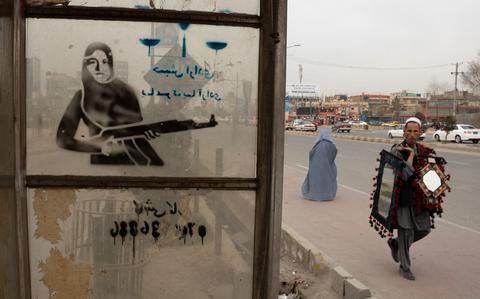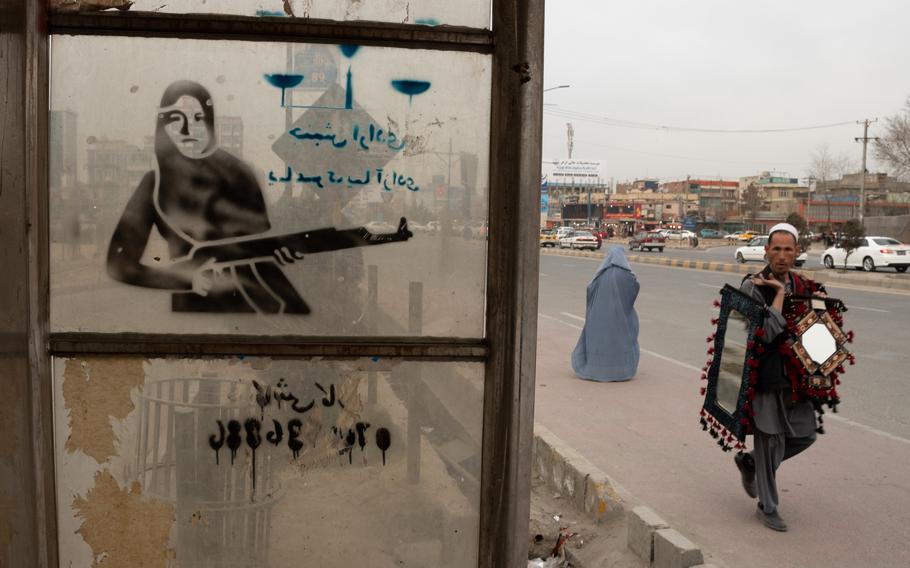

A man walks by a bus stop in Kabul, Afghanistan, February 2021, months before international forces left the country. A government watchdog agency said this week that U.S. funds could have ended up funding extremists in Afghanistan because two State Department bureaus didnt comply with regulations for vetting aid recipients. (Phillip Walter Wellman/Stars and Stripes)
Millions of dollars in U.S. taxpayer funds intended for development aid in Afghanistan may have helped extremists in the Taliban-run country, a government watchdog agency says.
An audit by the Special Inspector General for Afghanistan Reconstruction found that two State Department bureaus funding projects in the country couldn’t prove that they had complied with requirements for vetting aid recipients.
The Bureau of Democracy, Human Rights and Labor and the Bureau of International Narcotics and Law Enforcement failed to provide proper documentation for at least $293 million of aid they distributed, SIGAR said in a report of its findings released Wednesday.
“There is an increased risk that terrorist and terrorist-affiliated individuals and entities may have illegally benefited from State (Department) spending in Afghanistan,” the report said.
The audit examined five bureaus that had active awards in Afghanistan between March and November 2022. Three were able to demonstrate that they had complied with counterterrorism vetting requirements.
The State Department acknowledged the other two bureaus’ compliance gaps and, in a statement published with SIGAR’s report, agreed with its recommendation to immediately ensure that proper vetting measures are taken.
The U.S. has provided over $2.5 billion in assistance to Afghanistan — through the United Nations, other public international organizations and nongovernmental organizations — since it pulled all of its troops from the country in August 2021 after nearly two decades of fighting.
More than $1.7 billion of that funding has come from the State Department and the U.S. Agency for International Development to support humanitarian activities implemented by other organizations, SIGAR said.
International donors paused aid to Afghanistan when international forces withdrew from the country and the Taliban took control. Some aid started to flow back several months later, and humanitarian groups say it’s still desperately needed.
About half the country of 43 million people remains trapped in poverty, with 15 million Afghans facing food insecurity, according to an April report by the World Bank.
But the Taliban have tried to obtain U.S. aid funds “through several means, including the establishment of nongovernmental organizations,” SIGAR said.
The attempts to siphon off the money underscore the need for the State Department to “fully and consistently assess the risks posed by its implementing partners.”
The findings of a separate SIGAR investigation published in May showed that at least $10.9 million in U.S. taxpayer money had ended up in the hands of the Taliban since international forces withdrew, largely through taxes that partners paid to the group.
The Afghan Taliban are not a U.S.-designated terrorist organization, but the group maintains close ties with al-Qaida, according to U.S. assessments. In July 2022, the U.S. killed al-Qaida leader Ayman al-Zawahiri in Kabul.
The Haqqani Network, which is a designated foreign terrorist organization and a longtime ally of al-Qaida, is also an official semi-autonomous component of the Taliban.
“As State continues to spend U.S. taxpayer funds on programs intended to benefit the Afghan people, it is critical that (it) knows who is actually benefiting from this assistance in order to prevent the aid from being diverted to the Taliban or other sanctioned parties,” SIGAR said.






